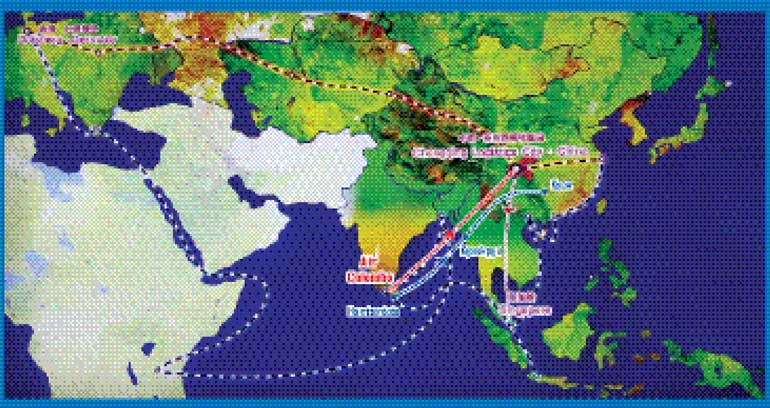Thursday Feb 19, 2026
Thursday Feb 19, 2026
Wednesday, 19 April 2017 00:00 - - {{hitsCtrl.values.hits}}
 By Jayasri Priyalal
By Jayasri Priyalal
The long-delayed oil and gas supply line from South Eastern China reaching Myanmar’s Kyaukpyu sea port has now commissioned operations following the agreements entered between President Xi Jinping and Myanmar’s President Htin Kyaw’s recent visit to Beijing. China’s two oceans strategy; to secure uninterrupted petroleum supplies from the Middle East move on smoothly and will not impede petroleum supplies to China; even if hostilities that may erupt in the South China Sea.
Will there be any economic benefits to be realised? What opportunities are unfolding with these geopolitical developments to Sri Lanka? Similarly, whether, the Sri Lankan policy makers are serious to capitalise on the vast scope of marine resources around the island embedded in the Indian Ocean for securing economic benefits? Unfortunately, it appears that the policymakers are grappling with many other domestic issues; with a debt trap tightening the finances owing to short-sighted investment decisions of the previous administration.
Instead, print and electronic media in Sri Lanka are currently dominated by news items on insider information led by uncles and nephews, bond scams, worsening the financial deficit of the country. History of the island nation is full of stories; on battles and betrayals between uncles and nephews, from the early days of Pandukabhaya to present day Gotabayas and Arjunas.
Hostilities that led to a war situation between Chulodhara and Mahodhara two Naga Kings, fighting for a jewel-studded throne, another tandem of uncle and nephew, paved the way for Gautama Buddha’s second visit to Nagadeepa. History is an important source for policy makers to learn from the trends; provided such lessons are taken as a guide to formulate strategies to envision a sustainable future. Human weaknesses, greed for power, accumulation of wealth through unfair means, and dangers of bonding with thieves are some causal factors that led to battles in the cases referred above in history.
This write up is to highlight the need for Sri Lanka to prioritise its relations with Myanmar (Burma). Myanmar has been a reliable trade partner of Sri Lanka in the past.
Both countries have inherited long-running conflicts, with the causal roots originating from colonial past. Fortunately, both the countries have regained the lost democratic space in the recent past. One can express hope for improved economic conditions in both countries, as democracies allow inevitable conflicts to be resolved in a way that maximises fairness and legitimacy and that broadly reflects society’s views.
Moreover, the concept of participatory democracy principles as in “Dasa Raja Dhamma” doctrine; preached by Gautama Buddha, still has some influence in both the countries. However, in the eyes of many foreign media; these principles may be not in line with the representative democracy models practiced by the western nation states.
Democracy is the best mechanism humans have come up with, for navigating the trade-offs and weaknesses inherent in different socio-economic systems. Unity in diversity can be established in a democratically functioning society as all citizens aspire for prosperity. As democratic societies create opportunities for individuals well-being achieved through own efforts. Recognition of everyone’s cultural identity, religious beliefs, and values system becomes an important fundamental right.
Sri Lanka and Myanmar need to forge a strong alliance to establish the common ground and the common interest to usher in prosperity for citizens of both countries. To start the process rolling, Sri Lanka needs to realise the advantage, being close proximity to the Myanmar’s Kyaukpyu sea port from Hambantota harbour.
The Government of Sri Lanka should expedite the management contract with the Chinese companies which are keen to operate in commercially viable manner. If not the opportunities would be lost to raise revenues to repay the huge loans taken to build the port in Hambantota, further weakening the fiscal position of Sri Lanka. Furthermore, it is worth noting in the current trends evolving in networked and subscription economy; connectivity between countries dominates sovereignty.
The common ground and the common interest to be invented should invariably realise win-win-win situations for all parties; namely, China, Myanmar, and Sri Lanka.
Aside from the shipping lines, the airlines should also commence direct flights from Colombo to Rangoon as early as possible. The private sector investors will certainly spot business opportunities in Myanmar and Sri Lanka to drive growth by stimulating the economy with investments. Cultural tourism, precious and semi-precious stones and other minerals found in Myanmar may certainly contribute towards value addition in the gem and jewellery industry, accruing mutual benefits to both the countries.
(The writer is the Regional Director responsible for Finance Sector; working with UNI Global Union Asia & Pacific Regional Organisation in Singapore.)